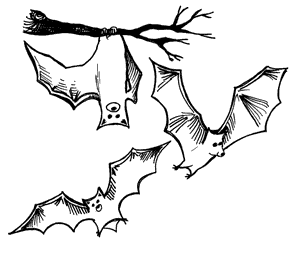STRANGE BUT TRUE- Jump start: Hanging bats fall into flight

DRAWING BY DEBORAH DERR McCLINTOCK
Q. Bats, you may know, are the only mammal to have evolved true flight. But why their strange habit of roosting and hanging upside down? –B. Stoker
A. It's far from just a habit, say Jerry D. Wilson and Anthony J. Buffa in College Physics. That is their natural takeoff position since, unlike birds, bats can't launch themselves from the ground. Their wings simply don't generate enough lift and their legs are too small and underdeveloped to attain sufficient takeoff speed. "So they use their claws, and then fall into flight when they are ready to go," say the authors.
Q. In the James Bond film Diamonds Are Forever, the police chase undercover Bond and smuggler Tiffany Case through the streets of Las Vegas, dozens of cars in hot pursuit. Bond swerves in and out of traffic but is soon cornered in a dead-end alley with a narrow walkway at the end– too narrow! He yells to Tiffany to lean to one side and up over a small ramp they go, tipping the car onto two wheels to drive on out. Nice stunt? –E. Knievel
A. Nice try, but at 3,000 pounds for the car, an estimated 7,500 lb-ft of torque was necessary to do the tipping, so the weight of Bond and Tiffany likely mattered little, says Barry Parker in Death Rays, Jet Packs, Stunts & Supercars: The Fantastic Physics of Film's Most Celebrated Secret Agent. Still, the leaning looked good in the movie. Tipping a car and staying there any length of time is extreme driving– rollover can occur, or with precise steering and enough maneuvering room the car can eventually be righted. Not easy in a tight walkway, so little wonder that of the 53 cars purchased for the chase scene, 24 were completely demolished.
After all that, a famous "booboo" occurred in the filming. Going into the alley the car is tipped up on the right side, and coming out it's on the left side, says Parker. The first of the scenes had been filmed in Vegas, the second in London, and somewhere along the way a cog slipped.
Q. Why might it be said of even violent volcanic eruptions like Mount St. Helens (1980) or Mount Pinatubo (1991) that "It's an ill wind that blows no one any good"? –P. Michaels
A. Volcanism– from Vulcan, the Roman god of fire– renews the Earth's land surface, says Brian Skinner in The Blue Planet. Lava and volcanic ash, under weathering, produce highly fertile soils. Some of the richest agricultural land in Italy has volcanic soil, true also in Japan, New Zealand, the Hawaiian Islands, the Philippines and Indonesia. Remarkably, within a year of the Mount St. Helens eruption, trees and other plants had started to sprout in the 600-sq-km area devastated by the lateral blast. In spite of great distress to the local population, farmers planted crops in the volcanic ash as soon as the eruption stopped.
Volcanoes can obviously wreak havoc and destruction in the short term, says the U.S. Geological Survey. But the "goods" are the long-term production of the Earth's crust on which we live and depend, raw materials for industry, valuable metallic minerals (gold, silver, copper, zinc), heat for geothermal energy, and more.
Q. Friendly dispute with your neighbor prompts her to suggest settling via a coin toss. Problem is she wants to use her own coin, and she's an amateur magician! Is there any good strategy for ensuring fairness even in case of a "loaded" coin? –H. Houdini
A. Try this (from mathematician John von Neumann): She'll make the call, you'll do the flipping, as follows: You toss the coin twice, and if the results match, you start over, forgetting both results. If the results differ, then use the first result as the coin-flip outcome and throw out the second. The reason this produces a fair result is that the probability of getting heads and then tails must be the same as getting tails and then heads, since the coin– even if biased– won't be changing its bias between flips. By excluding all same-outcome pairs of tosses, the coin flipper is left with the only two remaining outcomes, both with equal probability. (The stronger the coin's bias, the longer it will likely take to get the desired H-T or T-H result.) Success! Good math makes good neighbors.
Send Strange questions to brothers Bill and Rich at [email protected].
#